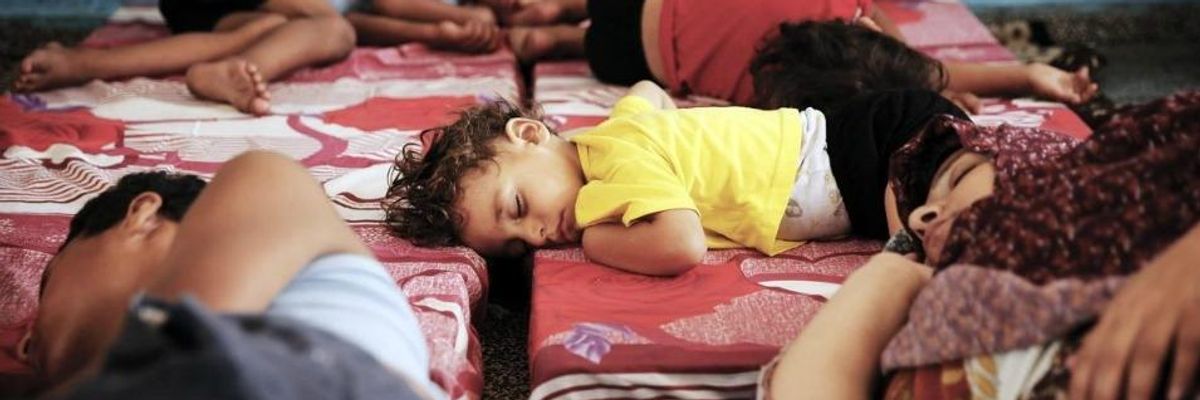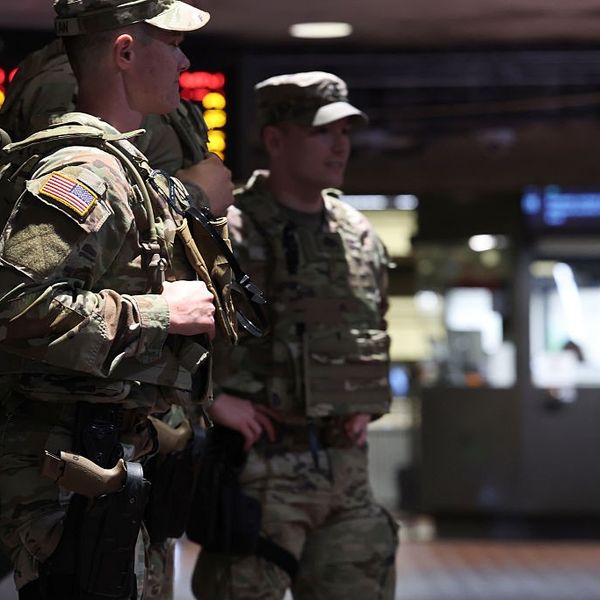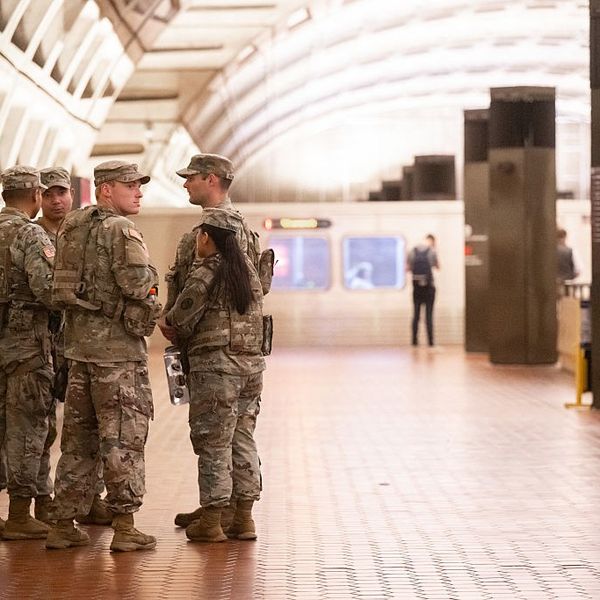
Palestinians sleep at a United Nations school, where people who fled heavy Israeli shelling in the Shejaia neighbourhood sought refuge during fighting, in Gaza City on July 21, 2014. (REUTERS/Finbarr O'Reilly)
Overcoming the Media Blockade in Gaza
According to the United Nations, one child has been killed in Gaza every hour for the past two days. Overall, the Israeli military has killed close to 700 Palestinians, the vast majority civilians, since the assault on Gaza began more than two weeks ago. Details of the slaughter make their way into the world's media, with horrific accounts of children killed on the beach, of hospital intensive-care units bombed, of first responders, searching for wounded amid the rubble, killed by Israeli sniper fire.
According to the United Nations, one child has been killed in Gaza every hour for the past two days. Overall, the Israeli military has killed close to 700 Palestinians, the vast majority civilians, since the assault on Gaza began more than two weeks ago. Details of the slaughter make their way into the world's media, with horrific accounts of children killed on the beach, of hospital intensive-care units bombed, of first responders, searching for wounded amid the rubble, killed by Israeli sniper fire. Armed resistance groups in Gaza, most notably that of the area's elected government, Hamas, have fired thousands of crude rockets that have killed two in Israel. Since Israel began its land invasion of Gaza, more than 30 Israeli soldiers have been killed. One of the greatest challenges in understanding the situation in Israel and the occupied Palestinian territories is getting reliable information. This latest assault on Gaza reaffirms the key role played by the U.S. media in maintaining the information blockade. It also highlights the increasing importance of pressure applied by social networks.
One headline said it all: "Missile at Beachside Gaza Cafe Finds Patrons Poised for World Cup." That was The New York Times, referring to a missile strike in Gaza that killed at least eight people on the beach in the town of Khan Younis. Ali Abunimah, a prominent Palestinian-American journalist who co-founded the website The Electronic Intifada, mockingly tweeted: "Israeli missile stops by Gaza cafe for a drink and dialogue with its Palestinian friends." The odd, passive phrasing of the original headline became the subject of a global social-media firestorm. The New York Times replaced the headline with "In Rubble of Gaza Seaside Cafe, Hunt for Victims Who Had Come for Soccer."
This wasn't the first time in this latest attack on Gaza that a major news organization got a black eye. On July 16, NBC reporter Ayman Mohyeldin witnessed an Israeli strike on a Gaza beach that killed four young boys who were playing soccer. After the deadly strike, Mohyeldin's graphic tweets alerted the world to the breaking news: "4 Palestinian kids killed in a single Israeli airstrike. Minutes before they were killed by our hotel, I was kicking a ball with them #gaza." He tweeted that they were all first cousins. He tweeted their names and ages:
"1) Ahed Atef Bakr 10 yrs old
2) Zakaria Ahed Bakr 10 yrs old
3) Mohamed Ramez Bakr 11 yrs old
4) Ismael Mohamed Bakr 9 yrs old"
Mohyeldin raced to the Al-Shifa hospital and witnessed members of the Bakr family as they learned of the killing of the boys. It would have been normal for the eyewitness to break the story on the "NBC Nightly News." Instead it was journalist Richard Engel on the screen reporting from Tel Aviv. Pulitzer Prize-winning Glenn Greenwald told me on the "Democracy Now!" news hour what he learned about NBC's decision-making around Mohyeldin after he reported on the deaths: "What was really stunning was, later that day, after what arguably was his biggest or one of his biggest events in his journalism career, where he really made a huge impact on having the world understand what's happening in Gaza, they not only blocked him from appearing on the air to talk about it on NBC News, but then they told him to leave Gaza immediately."
Social media lit up in protest, with the hashtag #letAymanreport. By Friday night, NBC announced that Mohyeldin would be back. Mohyeldin tweeted, "Thanks for all the support. Im returning to #Gaza to report. Proud of NBC's continued commitment to cover the #Palestinian side of the story."
But back in NBC's studios, the trouble was not over. Rula Jebreal is a Palestinian author and political analyst. She has been a paid contributor on MSNBC, where, during an interview this week, she critiqued that cable network's coverage of Gaza:
"We are disgustingly biased when it comes to this issue. Look at how [much] airtime [Prime Minister Benjamin] Netanyahu and his folks have on air on a daily basis, Andrea Mitchell and others. I never see one Palestinian being interviewed on these same issues." She tweeted later, "My forthcoming TV appearances have been canceled! Is there a link between my expose and the cancellation?" While MSNBC host Chris Hayes bravely brought her onto his show to discuss her critique, she is unsure if her contract will be renewed.
Early in this latest assault on Gaza, I asked Joshua Hantman, senior adviser to Israel's ambassador to the United States, about the mounting death toll, the majority civilian. He chillingly replied: "I'll be honest, the precision is quite outstanding. And there is no military in the history of the world that has actually used such precision targets." The terror and death wreaked by the precision of which Hantman boasts is made clear, day after day, thanks to the work of too few courageous journalists, supported by an engaged global citizenry, using social networks to overcome traditional media blockades.
Denis Moynihan contributed research to this column.
An Urgent Message From Our Co-Founder
Dear Common Dreams reader, The U.S. is on a fast track to authoritarianism like nothing I've ever seen. Meanwhile, corporate news outlets are utterly capitulating to Trump, twisting their coverage to avoid drawing his ire while lining up to stuff cash in his pockets. That's why I believe that Common Dreams is doing the best and most consequential reporting that we've ever done. Our small but mighty team is a progressive reporting powerhouse, covering the news every day that the corporate media never will. Our mission has always been simple: To inform. To inspire. And to ignite change for the common good. Now here's the key piece that I want all our readers to understand: None of this would be possible without your financial support. That's not just some fundraising cliche. It's the absolute and literal truth. We don't accept corporate advertising and never will. We don't have a paywall because we don't think people should be blocked from critical news based on their ability to pay. Everything we do is funded by the donations of readers like you. The final deadline for our crucial Summer Campaign fundraising drive is just days away, and we’re falling short of our must-hit goal. Will you donate now to help power the nonprofit, independent reporting of Common Dreams? Thank you for being a vital member of our community. Together, we can keep independent journalism alive when it’s needed most. - Craig Brown, Co-founder |
According to the United Nations, one child has been killed in Gaza every hour for the past two days. Overall, the Israeli military has killed close to 700 Palestinians, the vast majority civilians, since the assault on Gaza began more than two weeks ago. Details of the slaughter make their way into the world's media, with horrific accounts of children killed on the beach, of hospital intensive-care units bombed, of first responders, searching for wounded amid the rubble, killed by Israeli sniper fire. Armed resistance groups in Gaza, most notably that of the area's elected government, Hamas, have fired thousands of crude rockets that have killed two in Israel. Since Israel began its land invasion of Gaza, more than 30 Israeli soldiers have been killed. One of the greatest challenges in understanding the situation in Israel and the occupied Palestinian territories is getting reliable information. This latest assault on Gaza reaffirms the key role played by the U.S. media in maintaining the information blockade. It also highlights the increasing importance of pressure applied by social networks.
One headline said it all: "Missile at Beachside Gaza Cafe Finds Patrons Poised for World Cup." That was The New York Times, referring to a missile strike in Gaza that killed at least eight people on the beach in the town of Khan Younis. Ali Abunimah, a prominent Palestinian-American journalist who co-founded the website The Electronic Intifada, mockingly tweeted: "Israeli missile stops by Gaza cafe for a drink and dialogue with its Palestinian friends." The odd, passive phrasing of the original headline became the subject of a global social-media firestorm. The New York Times replaced the headline with "In Rubble of Gaza Seaside Cafe, Hunt for Victims Who Had Come for Soccer."
This wasn't the first time in this latest attack on Gaza that a major news organization got a black eye. On July 16, NBC reporter Ayman Mohyeldin witnessed an Israeli strike on a Gaza beach that killed four young boys who were playing soccer. After the deadly strike, Mohyeldin's graphic tweets alerted the world to the breaking news: "4 Palestinian kids killed in a single Israeli airstrike. Minutes before they were killed by our hotel, I was kicking a ball with them #gaza." He tweeted that they were all first cousins. He tweeted their names and ages:
"1) Ahed Atef Bakr 10 yrs old
2) Zakaria Ahed Bakr 10 yrs old
3) Mohamed Ramez Bakr 11 yrs old
4) Ismael Mohamed Bakr 9 yrs old"
Mohyeldin raced to the Al-Shifa hospital and witnessed members of the Bakr family as they learned of the killing of the boys. It would have been normal for the eyewitness to break the story on the "NBC Nightly News." Instead it was journalist Richard Engel on the screen reporting from Tel Aviv. Pulitzer Prize-winning Glenn Greenwald told me on the "Democracy Now!" news hour what he learned about NBC's decision-making around Mohyeldin after he reported on the deaths: "What was really stunning was, later that day, after what arguably was his biggest or one of his biggest events in his journalism career, where he really made a huge impact on having the world understand what's happening in Gaza, they not only blocked him from appearing on the air to talk about it on NBC News, but then they told him to leave Gaza immediately."
Social media lit up in protest, with the hashtag #letAymanreport. By Friday night, NBC announced that Mohyeldin would be back. Mohyeldin tweeted, "Thanks for all the support. Im returning to #Gaza to report. Proud of NBC's continued commitment to cover the #Palestinian side of the story."
But back in NBC's studios, the trouble was not over. Rula Jebreal is a Palestinian author and political analyst. She has been a paid contributor on MSNBC, where, during an interview this week, she critiqued that cable network's coverage of Gaza:
"We are disgustingly biased when it comes to this issue. Look at how [much] airtime [Prime Minister Benjamin] Netanyahu and his folks have on air on a daily basis, Andrea Mitchell and others. I never see one Palestinian being interviewed on these same issues." She tweeted later, "My forthcoming TV appearances have been canceled! Is there a link between my expose and the cancellation?" While MSNBC host Chris Hayes bravely brought her onto his show to discuss her critique, she is unsure if her contract will be renewed.
Early in this latest assault on Gaza, I asked Joshua Hantman, senior adviser to Israel's ambassador to the United States, about the mounting death toll, the majority civilian. He chillingly replied: "I'll be honest, the precision is quite outstanding. And there is no military in the history of the world that has actually used such precision targets." The terror and death wreaked by the precision of which Hantman boasts is made clear, day after day, thanks to the work of too few courageous journalists, supported by an engaged global citizenry, using social networks to overcome traditional media blockades.
Denis Moynihan contributed research to this column.
According to the United Nations, one child has been killed in Gaza every hour for the past two days. Overall, the Israeli military has killed close to 700 Palestinians, the vast majority civilians, since the assault on Gaza began more than two weeks ago. Details of the slaughter make their way into the world's media, with horrific accounts of children killed on the beach, of hospital intensive-care units bombed, of first responders, searching for wounded amid the rubble, killed by Israeli sniper fire. Armed resistance groups in Gaza, most notably that of the area's elected government, Hamas, have fired thousands of crude rockets that have killed two in Israel. Since Israel began its land invasion of Gaza, more than 30 Israeli soldiers have been killed. One of the greatest challenges in understanding the situation in Israel and the occupied Palestinian territories is getting reliable information. This latest assault on Gaza reaffirms the key role played by the U.S. media in maintaining the information blockade. It also highlights the increasing importance of pressure applied by social networks.
One headline said it all: "Missile at Beachside Gaza Cafe Finds Patrons Poised for World Cup." That was The New York Times, referring to a missile strike in Gaza that killed at least eight people on the beach in the town of Khan Younis. Ali Abunimah, a prominent Palestinian-American journalist who co-founded the website The Electronic Intifada, mockingly tweeted: "Israeli missile stops by Gaza cafe for a drink and dialogue with its Palestinian friends." The odd, passive phrasing of the original headline became the subject of a global social-media firestorm. The New York Times replaced the headline with "In Rubble of Gaza Seaside Cafe, Hunt for Victims Who Had Come for Soccer."
This wasn't the first time in this latest attack on Gaza that a major news organization got a black eye. On July 16, NBC reporter Ayman Mohyeldin witnessed an Israeli strike on a Gaza beach that killed four young boys who were playing soccer. After the deadly strike, Mohyeldin's graphic tweets alerted the world to the breaking news: "4 Palestinian kids killed in a single Israeli airstrike. Minutes before they were killed by our hotel, I was kicking a ball with them #gaza." He tweeted that they were all first cousins. He tweeted their names and ages:
"1) Ahed Atef Bakr 10 yrs old
2) Zakaria Ahed Bakr 10 yrs old
3) Mohamed Ramez Bakr 11 yrs old
4) Ismael Mohamed Bakr 9 yrs old"
Mohyeldin raced to the Al-Shifa hospital and witnessed members of the Bakr family as they learned of the killing of the boys. It would have been normal for the eyewitness to break the story on the "NBC Nightly News." Instead it was journalist Richard Engel on the screen reporting from Tel Aviv. Pulitzer Prize-winning Glenn Greenwald told me on the "Democracy Now!" news hour what he learned about NBC's decision-making around Mohyeldin after he reported on the deaths: "What was really stunning was, later that day, after what arguably was his biggest or one of his biggest events in his journalism career, where he really made a huge impact on having the world understand what's happening in Gaza, they not only blocked him from appearing on the air to talk about it on NBC News, but then they told him to leave Gaza immediately."
Social media lit up in protest, with the hashtag #letAymanreport. By Friday night, NBC announced that Mohyeldin would be back. Mohyeldin tweeted, "Thanks for all the support. Im returning to #Gaza to report. Proud of NBC's continued commitment to cover the #Palestinian side of the story."
But back in NBC's studios, the trouble was not over. Rula Jebreal is a Palestinian author and political analyst. She has been a paid contributor on MSNBC, where, during an interview this week, she critiqued that cable network's coverage of Gaza:
"We are disgustingly biased when it comes to this issue. Look at how [much] airtime [Prime Minister Benjamin] Netanyahu and his folks have on air on a daily basis, Andrea Mitchell and others. I never see one Palestinian being interviewed on these same issues." She tweeted later, "My forthcoming TV appearances have been canceled! Is there a link between my expose and the cancellation?" While MSNBC host Chris Hayes bravely brought her onto his show to discuss her critique, she is unsure if her contract will be renewed.
Early in this latest assault on Gaza, I asked Joshua Hantman, senior adviser to Israel's ambassador to the United States, about the mounting death toll, the majority civilian. He chillingly replied: "I'll be honest, the precision is quite outstanding. And there is no military in the history of the world that has actually used such precision targets." The terror and death wreaked by the precision of which Hantman boasts is made clear, day after day, thanks to the work of too few courageous journalists, supported by an engaged global citizenry, using social networks to overcome traditional media blockades.
Denis Moynihan contributed research to this column.

